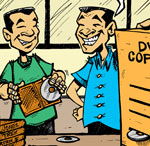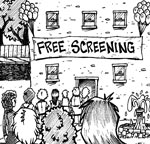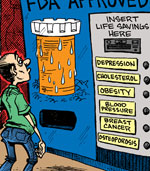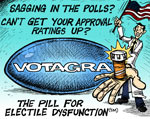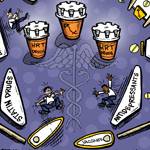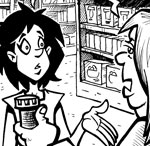Even for an Essential Nutrient, Vitamin D Overdose May Be Too Much of a Good Thing
| Share on Facebook | Share on Twitter | Share on Google+ |
It's always possible to get too much of a good thing. Vitamin D overdose is rare, but in susceptible individuals, the consequences can be severe.
Vitamin D Overdose at the Supermarket
Hans was a health-conscious shopper who had one notably unhealthy habit. He loved greasy, grilled hamburgers cooked on his backyard barbecue. One Saturday Hans walked into his neighborhood butcher shop and found that hamburger meat was on special, going for less than half price. But the hamburger looked rosy red and smelled fine.
Hans fired up the grill and gathered his family for their weekly greasy treat. The meat tasted fine and there were no ill effects until the next day when they all went for a hike in the woods. Even on a cloudy day and even while walking in dense woods, Hans and his family soon developed severe sunburn, so sunburn they had to go to the ER.
Taking Too Much Vitamin D Is More Common than You May Think
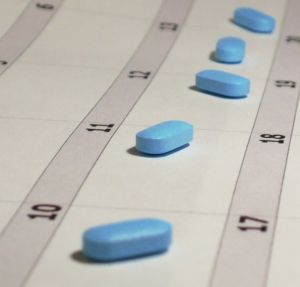
It turned out that the cause of the super-sensitivity to sunlight experienced by Hans, his wife, and their children was caused by an extreme overdose of vitamin D. Before the practice was banned, many butchers added vitamin D to ground meat to keep it from getting a green tint as it sat in the counter. Hans and his family had consumed the equivalent of nearly ten million units of vitamin D in just one meal, changing the physiology of their body in major ways. Fortunately, they were treated before the effects became permanent.
As a result of this and many similar case histories, the European Union severely regulates the use of vitamin D in food and supplements. The argument can be made that the EU comes down to hard on vitamin D dosages, but hypervitaminosis D, or vitamin D overdose, is more common than you might think.
What Are the Symptoms of Vitamin D Overdose?
Only the most extreme overdoses of vitamin D produce dramatic symptoms requiring emergency treatment. Usually hypervitaminosis causes symptoms that are more subtle and that occur over a period of weeks or months. Typical symptoms of too much vitamin D include:
- Loss of appetite.
- Nausea.
- Irritability.
- Fatigue.
Vitamin D itself usually does not cause drastic changes in health, but when vitamin D shifts calcium balance, then hypercalcemia, or the accumulation of calcium in the bloodstream, can. High calcium levels can cause groans, moans, stones, and psychiatric overtones manifesting themselves as abdominal pain, depression, bone pains, and confusion. A combination of too much vitamin D and too much calcium is especially problematic.
Does vitamin D cause constipation? It's actually calcium that causes constipation when you consume too much vitamin D, and fiber can both ease constipation and slow down the absorption of calcium.
How Much Vitamin D Is Too Much?
The symptoms of vitamin D overload usually kick in at about 100,000 IU per day, so most experts advise taking no more than 10% as much, or 10,000 IU per day. (A dose of 10,000 IU per day is equivalent to 1250 micrograms per day.) If you have active cancer, you should not take vitamin D except under the supervision of a physician. If you are pregnant, be sure that you also take vitamin K or eat several servings of green leafy vegetables to get your K, every week. If you have actually been poisoned by vitamin D, then stopping all vitamin D supplementation, consuming vitamin K, and avoiding calcium usually corrects symptoms in about a month.
Selected Reference:
Lips, P (2007). "Vitamin D status and nutrition in Europe and Asia". The Journal of steroid biochemistry and molecular biology 103 (3-5): 620–5.
-
Skin CareMen Skin Care
-
Free ResourcesFree eBooks
-
Health is not simply the absence of sickness.Hannah Green
-
Featured Health SupplementTotal Balance
 provides a broad spectrum of around 80 of the nutrients that your body needs…including vitamins, minerals, trace elements, antioxidants, amino acids, neuronutrients, bioflavonoids, carotenoids, herbal extracts, enzymes and other complementary co-factor ingredients.
provides a broad spectrum of around 80 of the nutrients that your body needs…including vitamins, minerals, trace elements, antioxidants, amino acids, neuronutrients, bioflavonoids, carotenoids, herbal extracts, enzymes and other complementary co-factor ingredients.
-

